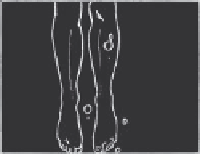Graphics Reference
In-Depth Information
decoration? I wonder how many degrees of separation there are between me sitting Toad
down in a comfortable position, chatting to him, and these sex dolls.
Another unsettling trend is dolls for grieving parents who have lost a new baby. These dolls
are made with precise accuracy from photographs. I cannot imagine the grief of losing a
child, but I can relate to wanting to keep the memory alive. A replica doll, though, seems an
uncomfortable way of dealing with the grief, as it raises the question of, having imbued this
doll with a personality and a life of sorts, how do you cope with the doll not growing, and
when and how do you put it to one side? I'm not sure I can understand taxidermy either. My
head reels with all this, as though I can too easily give things a personality, and even get huge
comfort from this; but in extreme circumstances, who knows what you would do?
Situations like this reinforce the idea that puppets and dolls are there to help some people
hide away from the real world, and to help maintain the illusion that all is alright. So often the
puppet world is safer than the real world, or the puppet provides something that is lacking.
Sometimes, distressingly, they can be given too much imbued life.
Transference
I am sure that any puppet animator experiences attention when he has his puppets with him,
but I seem to have encountered many people who have confused my puppets' personalities
with mine. I appreciate it, no, I love it, when people can enthusiastically identify with the
puppets, but it's unsettling for an outsider to project something from the i lm onto me. I have
talked of the two-way relationship between the animator and the animated, and the ease of
projecting emotions onto inanimate things, and I put myself into everything I do, but there
does seem to be something about puppet animation that attracts people who cross a line. I'm
gingerly skirting the issue of having had some obsessive fans and, once, a stalker. It is l attering,
but dii cult and confusing, as it was, to some extent, the characters that were being stalked.
I was the next best thing. I questioned how that could have happened, and I blame the puppets
for acting with unrestrained passion, emoting grand enviable emotions. Animators are not
celebrities in the way that opera singers, dancers and actors, whose talent is inseparable from
their physical persona, can be. You see the craft of the dancer and it's physical and undoubtedly
sexual, but animation doesn't have much sex appeal about it. Actors who have played Bond
are themselves seen as being sexy and tough. Actors who've played Jesus or characters in
long-running soap operas are similarly confused. This is odd but understandable. Something
does linger over, but to confuse an animator with a puppet is certainly interesting. I don't
think what we do is particularly unusual, but there is some mystery about it, something not
understood.
A great i lm that succinctly sums up the experience of being an animator is
Overtime
, in which
a dead puppeteer is given a heart-warming and unbearably touching send-of by his creations.
As he manipulated them in life, they manipulate him in death. Only a few minutes
long, in exquisite black-and-white computer graphics, the i lm captures accurately
the complex but very real relationship between animators and their creations. It
is a perfect i lm in so many ways; it's execution; it's rhythm; it's choice of music;
it's glorious movement; but above all it's celebration of a relationship. We may be
gone, but hopefully we've created something that lingers; a small legacy.


Search WWH ::

Custom Search